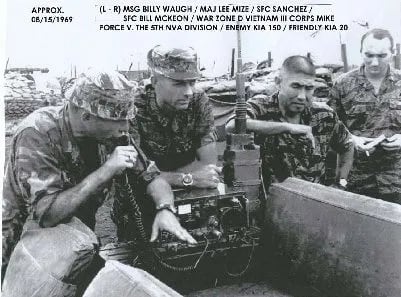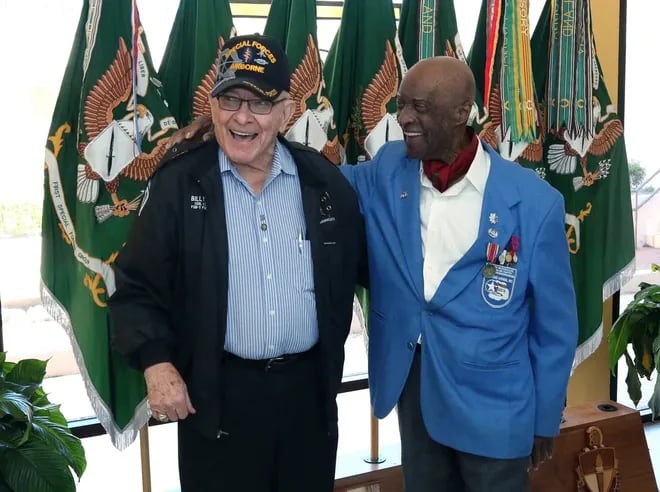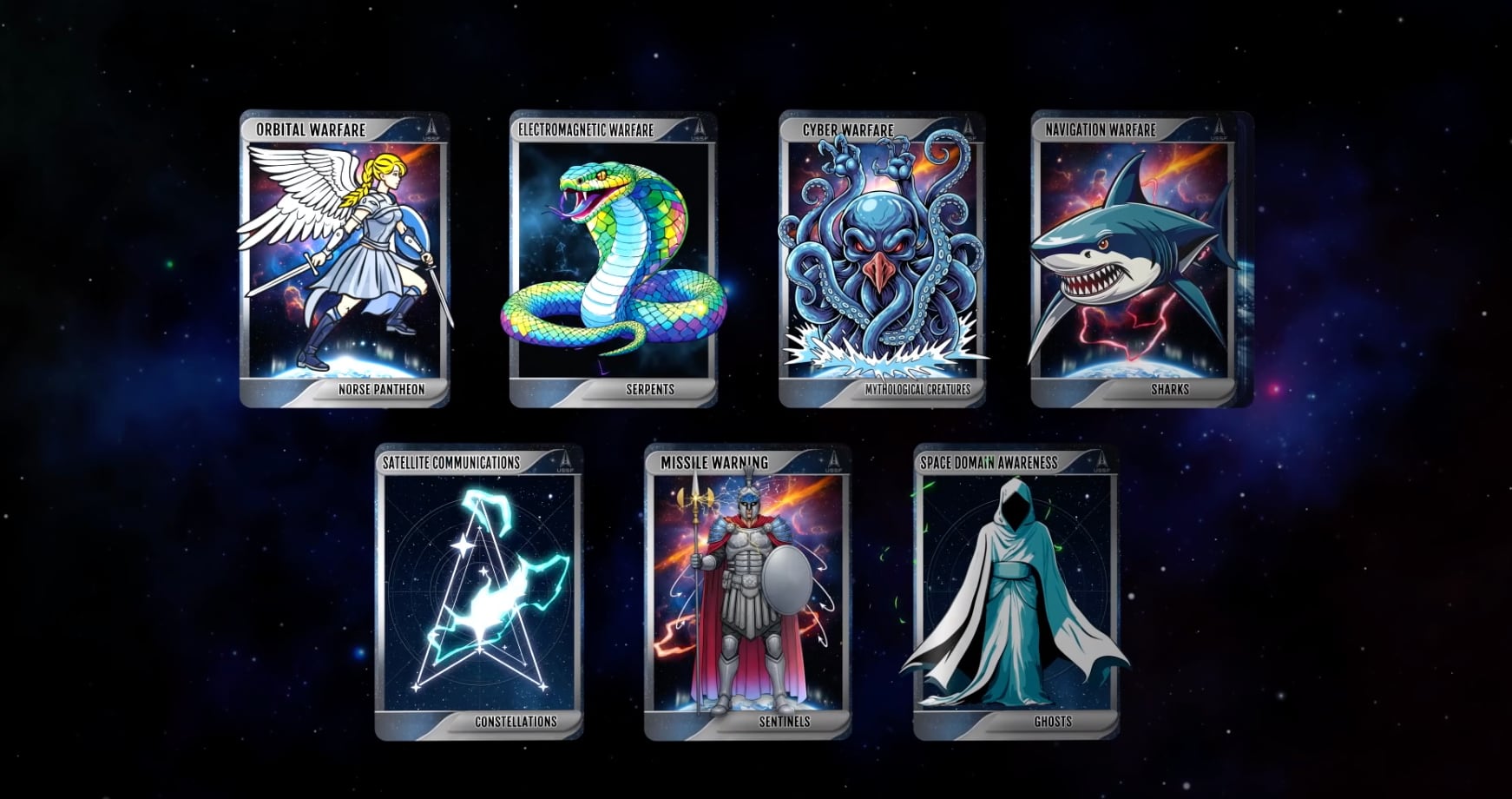Editor’s Note: This article was published as part of a content-sharing agreement between Army Times and The Fayetteville Observer.
Memories of the life of retired Sgt. Maj. William “Billy” Waugh are countless, some shared publicly, and others kept private due to the nature of his jobs.
Described as a legend with more than 50 years of service between the Special Forces and the CIA, Waugh died April 4 at the age of 93. He was honored at a ceremony this week hosted by the U.S. Special Operations Command at MacDill Air Force Base in Florida.
Waugh was a Green Beret who deployed to Vietnam several times, later worked with the CIA monitoring terrorists and deployed to Afghanistan at the age of 72.
Gen. Bryan Fenton, commander of the United States Special Operations Command, said Waugh lived his life fearlessly and victoriously.
The Green Beret era
Fenton said Waugh lived his life in three eras — first as a Green Beret, followed by serving with the CIA and then mentoring Special Forces soldiers.
Waugh enlisted in the Army in 1948, six months after his 18th birthday, Fenton said during Tuesday’s ceremony.
“And if you trace Billy’s career, you’ll trace the birth and the rise of our Army Special Forces. It seems like Billy was there at every historic step,” Fenton said.
Waugh earned his Green Beret in 1954, just two years after the Army’s first Special Forces unit, the 10th Special Forces Group, activated in Bad Tölz, West Germany.
Waugh would later deploy with Special Forces during the Vietnam War and was part of the Military Assistance Command - Vietnam Studies and Observations Group, a classified special operations unit that participated in irregular warfare and reconnaissance missions in Vietnam, Laos and Cambodia.
In 1965, Waugh was the team sergeant for retired Col. Paris Davis, who recently earned the Medal of Honor, said Lt. Gen. Patrick Roberson, deputy commander of the U.S. Army Special Operations Command.
Waugh and Davis’ team were part of an irregular defense group program where many Special Forces teams were put in enemy areas to build a partner force and to stop infiltration, Roberson said.
“Billy’s team got sent to one of the hottest, most active places in Vietnam,” Roberson said.
Roberson said Davis, Waugh and two other Special Forces soldiers led an indigenous company and went to an enemy base camp in Bin Den Provence and destroyed the camp with no issues.
On their way back, they were ambushed by a North Vietnamese army battalion and brigade, he said.
“Throughout that night (there was) combat, hand-to-hand combat, airstrikes, gunfights, 19 hours of fighting. Everybody was severely wounded. Sgt. Maj. Waugh almost lost his leg that night, but the team prevails,” Roberson said. “They destroyed the enemy and they basically pulled everybody out.”
Fenton said Waugh was saved by Davis. Waugh earned the Silver Star for his actions in that battle.
When Davis earned the Medal of Honor earlier this year, Fenton said he asked Waugh to tell him a little bit more about Davis.
“I said, ‘Tell me about Paris. Tell me about how you had to get him squared away and how you had to get him straight so he could win the Medal of Honor,’” Fenton said. “And Billy looked at me and said ... ‘General, I ain’t telling you (expletive). I loved that man.’”

Fenton said Waugh was also the first soldier to conduct a high-altitude, low-opening jump in the jungles of Vietnam. He described Waugh as a pioneer and pathfinder for techniques used by special operations today.
Waugh served in the Army for about 24 years followed by 25 years with the CIA.
“Billy was right there and Billy was fearless, and victory favors the fearless,” Fenton said. “He carried that into his second era with his time with the CIA.”
Carlos the Jackal, bin Laden and the CIA
Enrique Prado, retired CIA chief of operations for the Counterterrorist Center, said he got to know Waugh during the early 1990s in the Philippines less than a year after another legendary Green Beret, Nick Rowe, was assassinated in the streets of Manila.
Waugh was sent to the area to be a leader of a counter-surveillance team, Prado said during Tuesday’s ceremony.
Prado said that aside from “having hundreds of deployments in support of the CIA operations,” Waugh’s greatest reputation was in Khartum, the capital of Sudan.
Waugh and his teammates were responsible for helping find Ilich Ramirez Sanchez, a Venezuelan terrorist known as Carlos the Jackal, Prado said.
“The Jackal carried out some of the highest profile terrorist attacks in the 70s and 80s,” Prado said.
Prado said Waugh “spotted the portly white guy with a predator attitude coming out of an apartment complex” and got a photo that he submitted to his chief, Joseph “Cofer” Black.
Prado said headquarters confirmed Carlos the Jackal was in the photo, leading to his capture.
While Ramirez had not killed Americans, he was wanted by French authorities for his role in the deaths of a couple of their police officers.
“So, he is in a high-security prison in France for life thanks to Billy,” Prado said. “Then there was Bin Laden.”
In early 1992, Prado said, Waugh was tasked with surveying Osama bin Laden, founder of the Islamic terrorist organization al-Qaida.
“Billy’s cover, in his very own words,” Prado said, ‘was that of a crazy white guy from the U.S. embassy jogging around in the desert heat and pollution.’”
Prado said Waugh also established an observation post consisting of bulky, heavy cameras overlooking bin Laden’s compound.
“Billy loved to tell the story of how he carried this behemoth up five flights of stairs without being noticed,” Prado said.
Deployment to Afghanistan at age 72
Shortly after 9/11, Prado said, Waugh would deploy to Afghanistan at the age of 72.
Waugh visited Black to ask to go, Prado said.
“Then according to Cofer, and typical of Billy, Billy said, ‘Chief, you’ve got your senior intelligence service rank because I helped you capture Carlos the Jackal. You owe me.’”
Prado said Black kicked Waugh out of his office, and Waugh waited in the lobby “sulking” for about four hours.
Prado said Black called him to recount the story, and Prado told Black that he should let Waugh go to Afghanistan.
“He goes, ‘But what if he gets killed,’” Prado said. “I said chief, if Billy goes to Afghanistan and lives to tell about it the legend lives on. If Billy gets killed in Afghanistan, the legend lives on.”
Retired Lt. Gen. John Mulholland, a former USASOC commander, said he’d heard early in his career of Waugh’s legend.
Mulholland’s mentor when he deployed to Panama in the late 1970s was retired Special Forces Col. Tim Hope.
Hope told Mulholland that his father was a retired Special Forces soldier who deployed in 1961 as part of Project White Star in Laos with a “crazy team sergeant.”
The crazy sergeant was Waugh.
Waugh’s name would come up again years later in 1994 when Mulholland was assigned to a special mission unit at Fort Bragg and worked for the Joint Special Operations Command under then-Col. Eldon Bargewell.
Bargewell, Mulholland said, worked under Waugh when Bargewell was a young sergeant with the 5th Special Forces Group and MACV-SOG in Vietnam.
“Any time Billy’s name was mentioned with Eldon, it was, ‘Billy blanking Waugh,’” Mulholland said.
Mulholland said that during the early years of the Global War on Terror in Afghanistan, he finally was able to meet Waugh.
The Taliban had just been kicked out of Kabul and the CIA had set up a station in a hotel.
Mulholland said he was told that someone wanted to meet him.
“I’m in combat. We’re in Afghanistan. I’m like, ‘Who the hell wants to meet me at this point in time?’ But he goes, “It’s Billy Waugh ….,” Mulholland said. “And there’s Billy — all kitted up at the young age of 72.”
Mulholland said he tried to remain respectful but asked Waugh what he was doing in Afghanistan.
Waugh told Mulholland that he was getting ready to go out on a mission with one of Mulholland’s Special Forces A teams.
“Ever since those days, I’ve had the great pleasure of now calling Billy my close friend,” Mulholland said.
Remembering Billy
Fenton said Waugh’s last era in life was “investing in the future.”
Roberson said that during the early 2000s, Waugh made it a habit to visit the John F. Kennedy Special Warfare Center and School, which is on Fort Liberty, to mentor and talk to special operation forces officers, noncommissioned officers and warrant officers.
“He was unselfish with his time and very unselfish about wanting other people to be as successful as he was,” Roberson said.

During one of Fenton’s final visits with Waugh, Fenton said, Waugh immediately asked leaders if they were taking care of their men and women in uniform.
" And that’s the last thing he said as we walked out because that was always on his mind,” Fenton said.
Prado said while Waugh was legendary for his exploits, confidence, charm, wit and intellect, he was loved for “his modest and unpretentious interactions with chiefs and subordinates.”
“We will miss Billy’s handshake and his mischievous smile, but our beloved Billy will always be in our hearts,” Prado said. “We will never stop admiring him for his exploits and for his love for his two alma maters, Green Berets and CIA.”
Mulholland said Waugh was born to be a soldier and loved being part of Army Special Forces.
“Billy was true to his essential self and he contributed mightily to the security of the United States as many, many fallen enemies can attest to,” Mulholland said.
During the conclusion of Tuesday’s ceremony, Fenton read Waugh’s dedication to Special Forces soldiers and those killed in action in Waugh’s autobiography: “You’ve been in my life for so long I’ll work at that job until I join you.”
“Billy did it, and so much more,” Fenton said.





